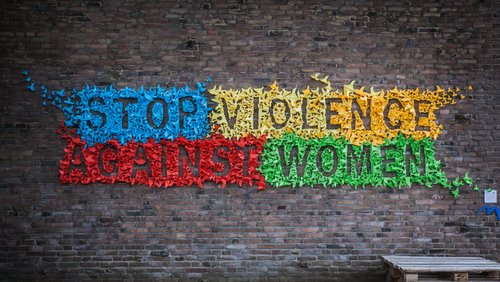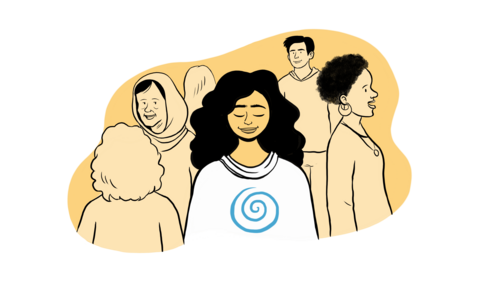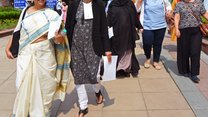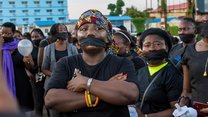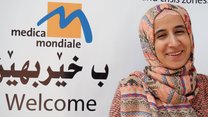What we do: Our fields of activity
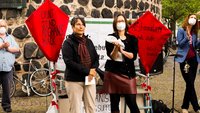
We work to ensure the rights of and protection for women and girls in conflict areas and we support the survivors of sexualised violence. We are working towards an end to sexualised violence in conflict and post-conflict regions. As an international feminist organisation, we do this in joint initiatives with women’s rights organisations and activists fighting against gender-based violence in their regions. Together, we work in three strategic fields of activity.
1. Preventing violence against women
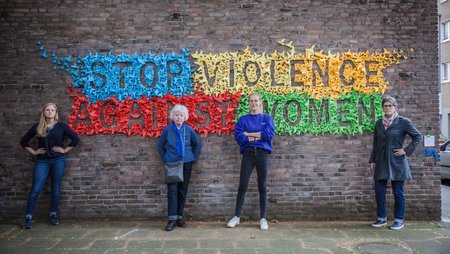
Education on sexualised violence and its causes
medica mondiale uses PR work, campaigns and actions to educate society about sexualised wartime violence. Our aim is to raise awareness of how the causes and consequences of sexualised violence are similar around the world, regardless of whether a country is currently in a situation of conflict or not. We call for a public discussion of patriarchal norms and structural systems of repression – both in Germany and in our priority regions. After all, sexualised violence cannot be eliminated unless its causes and consequences are clearly recognised and acknowledged. Political countermeasures can then be developed and implemented.
Advocating for the protection and equal rights of women
State and political institutions can play a central role in the prevention of violence. This is true within a country and also at the international level: via the United Nations or the German government, for example. We engage in political advocacy to demand institutional protection and legislative equality of women in conflict and post-conflict regions. Together with our partner organisations, we call for women to be involved in the shaping of conflict prevention, peace processes and reconstruction efforts and for their political participation, in order to represent their own rights and interests.
Empowering women and girls
Our programmes ensure that women and girls have access to protected spaces where they can inform, develop and empower themselves. Women and girls are educated about their rights and supported in their efforts to assert these rights. We create access to knowledge, education, training and property, allowing women and girls to enlarge their scope for action and resist the discrimination and violence they face.
2. Solidarity and support for survivors
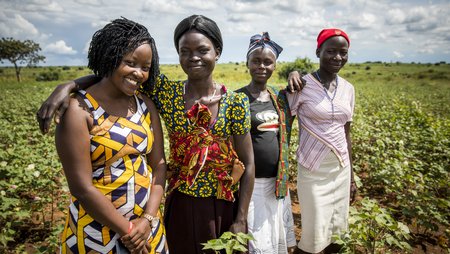
Integrated support for survivors of sexualised violence
Women and girls who have survived rape and torture receive support to cope with their experiences of violence. Our work also involves the family surroundings of the survivors, including their husbands, in-laws and children. In our programs, partner organisations offer survivors solidarity and direct psychosocial, medical, legal and economic assistance. They also enable access to police, justice or health authorities. The aim is to empower female survivors and to help them demand and exercise a self-determined participation in the life of their society.
Establishing community-based protection networks
Together with local women’s organisations and activists, we build up community-based women’s support groups, protection networks and referral system for survivors of sexualised violence. From within these structures, activists can work to support women and girls affected by violence and raise awareness within their social surroundings of topics relating to gender justice. They form a link between survivors, communities, local authorities and institutional structures, helping women and girls to assert their rights.
Anchoring trauma-sensitivity within institutions
We provide training for civil society and state institutions, especially those from the judiciary, police and healthcare sectors in our priority regions, enabling them to adopt a Stress- and Trauma-sensitive Approach when responding to and treating women and girls affected by violence. We are working to ensure that an appropriately adapted Stress- and Trauma-sensitive Approach is anchored institutionally. For instance, it should become part of statutory training programmes. Furthermore, we promote the integration of self- and team care in the everyday routines of all staff working with survivors of sexualised violence.
Political acknowledgement and reparations for survivors
Survivors of sexualised violence suffer many consequences of the violence, but are often left alone to cope with their trauma. They are frequently excluded from their societies and subjected to renewed violence and denigration. In our priority regions, at an international level, and in dialogue with the German government, we advocate for measures to ensure survivors of sexualised wartime violence receive integrated support, public acknowledgement and compensation. We also campaign for international and local prosecution of the perpetrators.
Promoting a socio-political understanding of trauma
In Germany we provide training for specialist staff in the field of international co-operation, especially peacebuilding, and for those working with migrants and refugees, as well as students on internationally oriented degree programs. We also pass on our expertise in trauma-sensitivity as part of further training and coaching sessions. We are actively committed to spreading the socio-political understanding of trauma, promoting a critical discussion on trauma within Germany and internationally. Our Stress- and Trauma-sensitive Approach (STA) promotes a power-critical understanding of trauma and sexualised violence that takes into account the intersections of various structures of oppression such as racism and sexism.
3. Strengthening feminist action
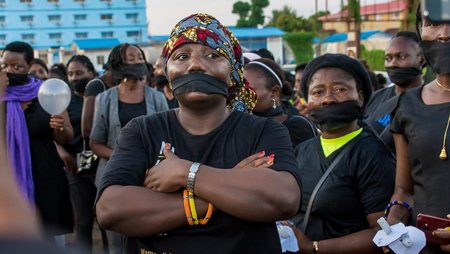
A strong feminist civil society plays a decisive role in promoting gender justice, changing power relations, and combatting sexualised violence. For this reason, we provide targeted long-term support to local and regional women’s organisations, networks and activists in our priority regions. We also work together with other feminist organisations in Germany and internationally.
Supporting changemakers
For our partner organisations, we help to secure resources and spaces that enable them to enhance their structures, strategies and networks. We support the development of competencies, organisational structures and expertise-sharing across countries and regions. The aim is to assist our partners as they increase their visibility, agenda-setting power and societal influence.
Protecting women’s rights defenders
At the international level, we promote the protection and empowerment of women’s rights defenders in their roles as political stakeholders, advocates and civil watchdogs. Faced with an increase in anti-feminist threats to women’s rights activists around the world, we exercise solidarity and political action to ensure the protection, independence and resilience of activists in our priority regions.
Working together in feminist alliances
In order to strengthen the interests of our organisation and our partners, we actively work together with feminist stakeholders worldwide. We network within consortia and umbrella associations, in alliances and for specific campaigns. Together we are actively working towards a gender-equitable world free of sexualised violence.
